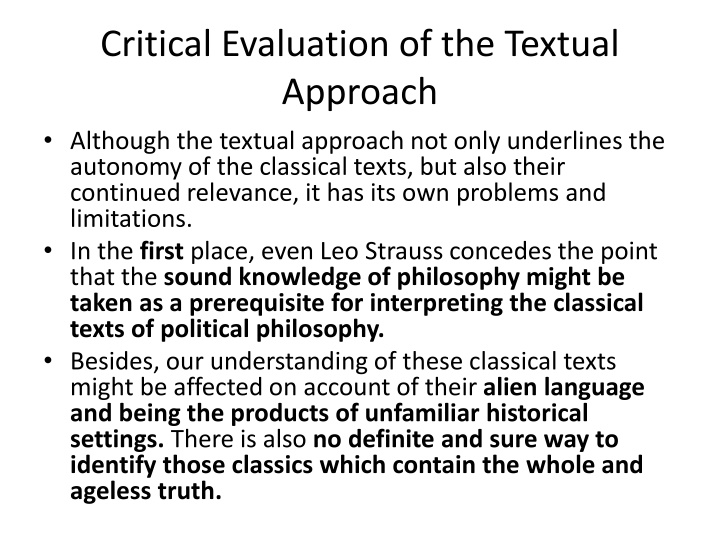
Challenges and Strengths of Textual Approach in Interpretation
Explore the challenges of interpreting classical texts through a textual approach, highlighting issues such as language barriers, historical context, and the potential for promoting dogmatism. Despite its limitations, the approach also offers strengths in preserving universal ideas and fostering progressive interpretations, as demonstrated in various cultural and judicial contexts.
Download Presentation

Please find below an Image/Link to download the presentation.
The content on the website is provided AS IS for your information and personal use only. It may not be sold, licensed, or shared on other websites without obtaining consent from the author. If you encounter any issues during the download, it is possible that the publisher has removed the file from their server.
You are allowed to download the files provided on this website for personal or commercial use, subject to the condition that they are used lawfully. All files are the property of their respective owners.
The content on the website is provided AS IS for your information and personal use only. It may not be sold, licensed, or shared on other websites without obtaining consent from the author.
E N D
Presentation Transcript
Critical Evaluation of the Textual Approach Although the textual approach not only underlines the autonomy of the classical texts, but also their continued relevance, it has its own problems and limitations. In the first place, even Leo Strauss concedes the point that the sound knowledge of philosophy might be taken as a prerequisite for interpreting the classical texts of political philosophy. Besides, our understanding of these classical texts might be affected on account of their alien language and being the products of unfamiliar historical settings. There is also no definite and sure way to identify those classics which contain the whole and ageless truth.
Critical Evaluation of the Textual (contd.) Secondly, it is universally agreed that classics contain both temporal and timeless truth. For example, Aristotle s principle of golden mean might hold ground for ages to come, but not his defence of the institution of slavery. Besides, it is difficult to predict whether a principle is historical or really eternal and timeless. Thus, it is rather odd to hold an entire text as an expression of an absolute and ageless truth. Thirdly, particularly in the case of religious texts, the textual approach always results in their literal meanings. Such an approach might mar free enquiry and new interpretation needed for meeting the needs of the changing times.
Critical Evaluation of the Textual (contd.) Besides, such an attitude might promote a culture of dogmatism, obscurantism and fundamentalism. In more precise terms, it might promote socially and culturally abhorrent practices like untouchability and jihad. Despite the above problems, the textual approach has its own strength. While underlining the importance of the context, the autonomy of the text could not be totally ignored. It is out of these texts that certain ideas flow which assume universal and perennial forms. Besides, at times textual interpretation might be used for promoting progressive ideas.
Concluding Observations One could cite numerous examples to support such contention. Dayanand s interpretationof the Vedas and Tilak s and Gandhi s interpretation of Bhagavad Gita contributed greatly to a new age of reformation in Hinduism. Besides, in judicial matters, old, legal and constitutional texts are often used and interpreted to promote progressive ideas.
